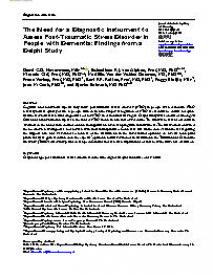The Need for a Diagnostic Instrument to Assess Post-Traumatic Stress Disorder in People with Dementia : Findings from a Delphi Study.
Cognitive and behavioral aspects may mask posttraumatic stress disorder (PTSD) in people with dementia. PTSD severely lowers quality of life in people with dementia. Proper recognition of PTSD is essential to ensure adequate treatment. However, a valid diagnostic tool for PTSD in dementia is lacking. A Delphi study was conducted among 20 Dutch and 6 international experts in the field of PTSD and dementia care or research. The aim was to reach consensus in 3 rounds on the added value, form, content, and application for developing such an instrument. The first round confirmed the need for a new diagnostic tool for research and clinical practice. Consensus was reached on 23 statements regarding the support base and 19 related to content of the instrument. In the third round, opinions on several conceptual problems were gathered. Based on the experts’ opinions, a draft version of an instrument, the TRAuma and DEmentia interview (TRADE-interview), was developed. Clinical and research implications of this new measure are discussed.
In: Journal of Geriatric Psychiatry and Neurology ; ISSN: 0891-9887 | June
https://doi.org/10.1177/08919887221103583
Online ahead of print DOI:10.1177/08919887221103583


